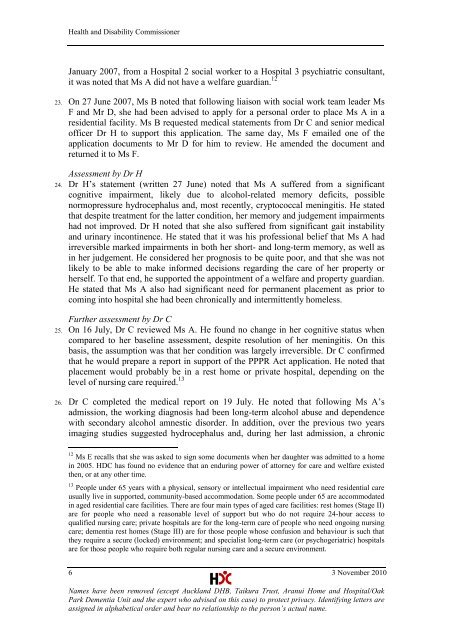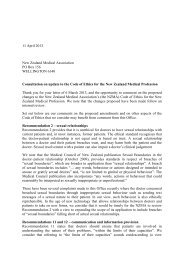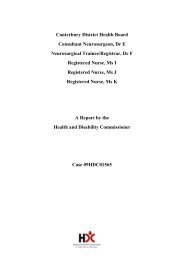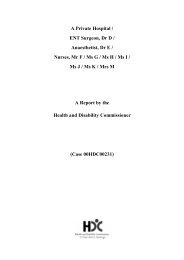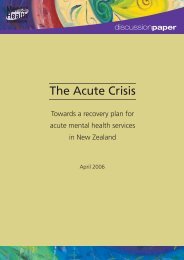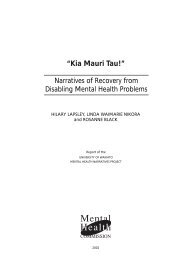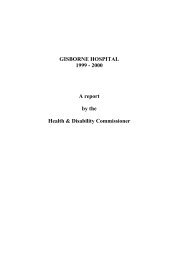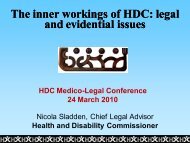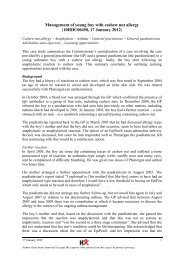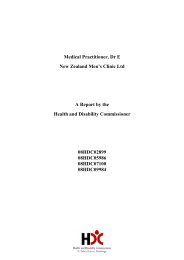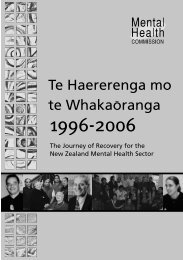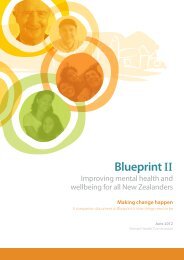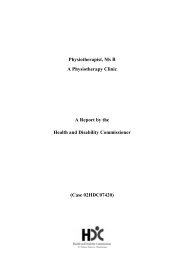Auckland District Health Board Taikura Trust Aranui Home and ...
Auckland District Health Board Taikura Trust Aranui Home and ...
Auckland District Health Board Taikura Trust Aranui Home and ...
You also want an ePaper? Increase the reach of your titles
YUMPU automatically turns print PDFs into web optimized ePapers that Google loves.
<strong>Health</strong> <strong>and</strong> Disability Commissioner<br />
January 2007, from a Hospital 2 social worker to a Hospital 3 psychiatric consultant,<br />
it was noted that Ms A did not have a welfare guardian. 12<br />
23. On 27 June 2007, Ms B noted that following liaison with social work team leader Ms<br />
F <strong>and</strong> Mr D, she had been advised to apply for a personal order to place Ms A in a<br />
residential facility. Ms B requested medical statements from Dr C <strong>and</strong> senior medical<br />
officer Dr H to support this application. The same day, Ms F emailed one of the<br />
application documents to Mr D for him to review. He amended the document <strong>and</strong><br />
returned it to Ms F.<br />
Assessment by Dr H<br />
24. Dr H’s statement (written 27 June) noted that Ms A suffered from a significant<br />
cognitive impairment, likely due to alcohol-related memory deficits, possible<br />
normopressure hydrocephalus <strong>and</strong>, most recently, cryptococcal meningitis. He stated<br />
that despite treatment for the latter condition, her memory <strong>and</strong> judgement impairments<br />
had not improved. Dr H noted that she also suffered from significant gait instability<br />
<strong>and</strong> urinary incontinence. He stated that it was his professional belief that Ms A had<br />
irreversible marked impairments in both her short- <strong>and</strong> long-term memory, as well as<br />
in her judgement. He considered her prognosis to be quite poor, <strong>and</strong> that she was not<br />
likely to be able to make informed decisions regarding the care of her property or<br />
herself. To that end, he supported the appointment of a welfare <strong>and</strong> property guardian.<br />
He stated that Ms A also had significant need for permanent placement as prior to<br />
coming into hospital she had been chronically <strong>and</strong> intermittently homeless.<br />
Further assessment by Dr C<br />
25. On 16 July, Dr C reviewed Ms A. He found no change in her cognitive status when<br />
compared to her baseline assessment, despite resolution of her meningitis. On this<br />
basis, the assumption was that her condition was largely irreversible. Dr C confirmed<br />
that he would prepare a report in support of the PPPR Act application. He noted that<br />
placement would probably be in a rest home or private hospital, depending on the<br />
level of nursing care required. 13<br />
26. Dr C completed the medical report on 19 July. He noted that following Ms A’s<br />
admission, the working diagnosis had been long-term alcohol abuse <strong>and</strong> dependence<br />
with secondary alcohol amnestic disorder. In addition, over the previous two years<br />
imaging studies suggested hydrocephalus <strong>and</strong>, during her last admission, a chronic<br />
12 Ms E recalls that she was asked to sign some documents when her daughter was admitted to a home<br />
in 2005. HDC has found no evidence that an enduring power of attorney for care <strong>and</strong> welfare existed<br />
then, or at any other time.<br />
13 People under 65 years with a physical, sensory or intellectual impairment who need residential care<br />
usually live in supported, community-based accommodation. Some people under 65 are accommodated<br />
in aged residential care facilities. There are four main types of aged care facilities: rest homes (Stage II)<br />
are for people who need a reasonable level of support but who do not require 24-hour access to<br />
qualified nursing care; private hospitals are for the long-term care of people who need ongoing nursing<br />
care; dementia rest homes (Stage III) are for those people whose confusion <strong>and</strong> behaviour is such that<br />
they require a secure (locked) environment; <strong>and</strong> specialist long-term care (or psychogeriatric) hospitals<br />
are for those people who require both regular nursing care <strong>and</strong> a secure environment.<br />
6 3 November 2010<br />
Names have been removed (except <strong>Auckl<strong>and</strong></strong> DHB, <strong>Taikura</strong> <strong>Trust</strong>, <strong>Aranui</strong> <strong>Home</strong> <strong>and</strong> Hospital/Oak<br />
Park Dementia Unit <strong>and</strong> the expert who advised on this case) to protect privacy. Identifying letters are<br />
assigned in alphabetical order <strong>and</strong> bear no relationship to the person’s actual name.


